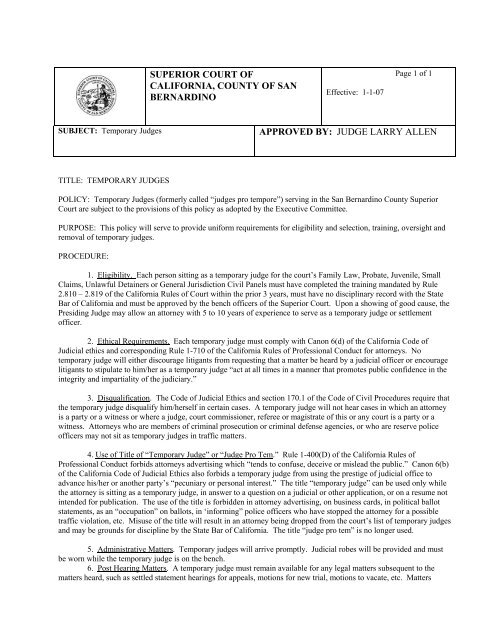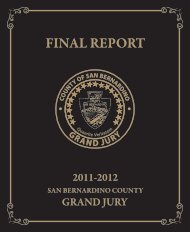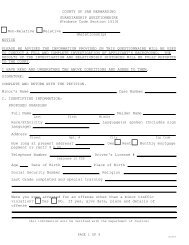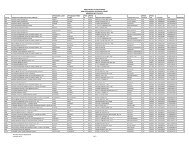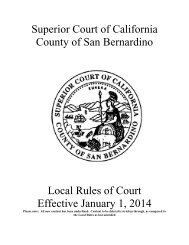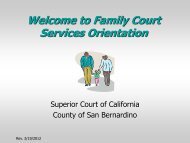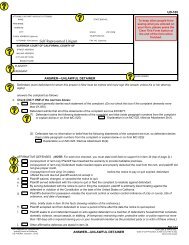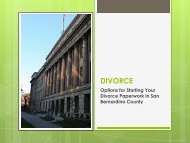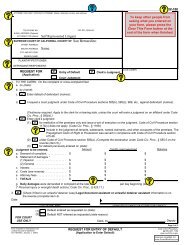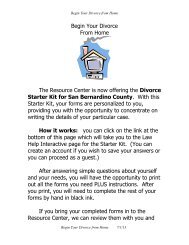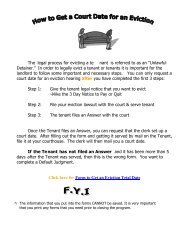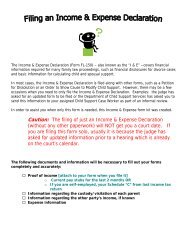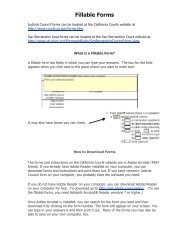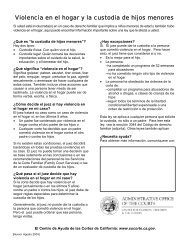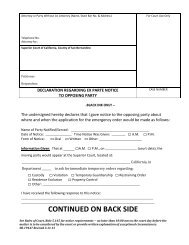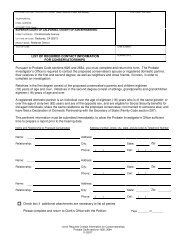Temporary Judge Court Policy - San Bernardino Superior Court
Temporary Judge Court Policy - San Bernardino Superior Court
Temporary Judge Court Policy - San Bernardino Superior Court
You also want an ePaper? Increase the reach of your titles
YUMPU automatically turns print PDFs into web optimized ePapers that Google loves.
SUPERIOR COURT OF<br />
CALIFORNIA, COUNTY OF SAN<br />
BERNARDINO<br />
Effective: 1-1-07<br />
Page 1 of 1<br />
SUBJECT: <strong>Temporary</strong> <strong>Judge</strong>s<br />
APPROVED BY: JUDGE LARRY ALLEN<br />
TITLE: TEMPORARY JUDGES<br />
POLICY: <strong>Temporary</strong> <strong>Judge</strong>s (formerly called “judges pro tempore”) serving in the <strong>San</strong> <strong>Bernardino</strong> County <strong>Superior</strong><br />
<strong>Court</strong> are subject to the provisions of this policy as adopted by the Executive Committee.<br />
PURPOSE: This policy will serve to provide uniform requirements for eligibility and selection, training, oversight and<br />
removal of temporary judges.<br />
PROCEDURE:<br />
1. Eligibility. Each person sitting as a temporary judge for the court’s Family Law, Probate, Juvenile, Small<br />
Claims, Unlawful Detainers or General Jurisdiction Civil Panels must have completed the training mandated by Rule<br />
2.810 – 2.819 of the California Rules of <strong>Court</strong> within the prior 3 years, must have no disciplinary record with the State<br />
Bar of California and must be approved by the bench officers of the <strong>Superior</strong> <strong>Court</strong>. Upon a showing of good cause, the<br />
Presiding <strong>Judge</strong> may allow an attorney with 5 to 10 years of experience to serve as a temporary judge or settlement<br />
officer.<br />
2. Ethical Requirements. Each temporary judge must comply with Canon 6(d) of the California Code of<br />
Judicial ethics and corresponding Rule 1-710 of the California Rules of Professional Conduct for attorneys. No<br />
temporary judge will either discourage litigants from requesting that a matter be heard by a judicial officer or encourage<br />
litigants to stipulate to him/her as a temporary judge “act at all times in a manner that promotes public confidence in the<br />
integrity and impartiality of the judiciary.”<br />
3. Disqualification. The Code of Judicial Ethics and section 170.1 of the Code of Civil Procedures require that<br />
the temporary judge disqualify him/herself in certain cases. A temporary judge will not hear cases in which an attorney<br />
is a party or a witness or where a judge, court commissioner, referee or magistrate of this or any court is a party or a<br />
witness. Attorneys who are members of criminal prosecution or criminal defense agencies, or who are reserve police<br />
officers may not sit as temporary judges in traffic matters.<br />
4. Use of Title of “<strong>Temporary</strong> <strong>Judge</strong>” or “<strong>Judge</strong> Pro Tem.” Rule 1-400(D) of the California Rules of<br />
Professional Conduct forbids attorneys advertising which “tends to confuse, deceive or mislead the public.” Canon 6(b)<br />
of the California Code of Judicial Ethics also forbids a temporary judge from using the prestige of judicial office to<br />
advance his/her or another party’s “pecuniary or personal interest.” The title “temporary judge” can be used only while<br />
the attorney is sitting as a temporary judge, in answer to a question on a judicial or other application, or on a resume not<br />
intended for publication. The use of the title is forbidden in attorney advertising, on business cards, in political ballot<br />
statements, as an “occupation” on ballots, in ‘informing” police officers who have stopped the attorney for a possible<br />
traffic violation, etc. Misuse of the title will result in an attorney being dropped from the court’s list of temporary judges<br />
and may be grounds for discipline by the State Bar of California. The title “judge pro tem” is no longer used.<br />
5. Administrative Matters. <strong>Temporary</strong> judges will arrive promptly. Judicial robes will be provided and must<br />
be worn while the temporary judge is on the bench.<br />
6. Post Hearing Matters. A temporary judge must remain available for any legal matters subsequent to the<br />
matters heard, such as settled statement hearings for appeals, motions for new trial, motions to vacate, etc. Matters
should be taken under submission only when extraordinary circumstances exist and should be decided within 14 days.<br />
Traffic matters should not be taken under submission without a waiver of appearance from the defendant.<br />
7. Notice to the <strong>Court</strong> of Criminal Charges, Disciplinary Action. Within 5 days of the filing of criminal<br />
charges in any jurisdiction or the initiation of State Bar disciplinary proceedings against an attorney who sits as a<br />
temporary judge, he/she must immediately inform the Presiding <strong>Judge</strong> of the <strong>Superior</strong> <strong>Court</strong> in writing of that action, as<br />
well as later inform the Presiding <strong>Judge</strong> in writing of the outcome of the criminal charges or state bar disciplinary<br />
proceeding as soon as they are announced.<br />
8. Notice of Policies. The above policy and temporary judge guidelines will be furnished to each temporary<br />
judge, who will be required to sign a statement that he/she has received them and will abide by them<br />
Adopted: January 1, 2007


